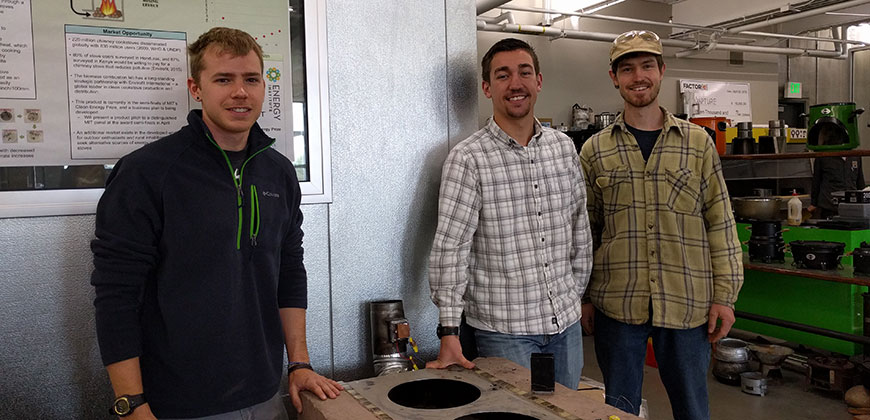
Qapture team members Thor Hogberg, Tom Decker and Kyle Greer with their prototype waste heat reduction device in the Powerhouse Energy Campus cookstoves lab.
Solving a really big problem often starts with a really good idea.
CSU researchers have an idea that could improve indoor air quality for people in the developing world, while providing access to electricity. A group of graduate students at the Powerhouse Energy Campus’ Advanced Biomass Combustion Lab, led by research scientist John Mizia, are developing a device for reducing harmful pollutants from chimney stoves, which millions of people worldwide use every day for cooking. Their device retrofits onto existing stoves, captures waste heat, reduces emissions, and provides a power source that can charge cell phones and other small electronics.
Their product, which forms the basis for a startup company called Qapture (a play on the “Q.dot” heat transfer equation), recently garnered two separate prizes that will help bring the idea to bear.
A prize-winning idea
Hogberg and Greer won the CSU Collegiate Challenge Innovation Symposium, held earlier this spring, grabbing the $1,000 “Best in Show” prize after presenting their research for judges. That same week, they traveled east with Qapture team members Tom Decker and Kelly Banta and took home $15,000 from the Massachusetts Institute of Technology Clean Energy Prize competition. The team won that competition’s Factor[e] Ventures Energy for Development Prize, which recognizes a company’s potential for market success.
The device, protected by a provisional patent filed through CSU Ventures, consists of a thermoelectric generator that converts waste heat from the cookstove into electricity. The generator powers a soot reduction device in the combustion chamber, while also providing a place to plug in a cell phone.
“We’re using a technology that’s existed for actually a very long time – the thermoelectric generator,” Greer said. “The relationship between heat flux and electricity has long been known, but we’re starting to see more and more thermoelectric generators being mass produced for all kinds of waste heat applications.”
Hogberg and Greer are advised by Mizia, a research scientist at the CSU Energy Institute who leads the Advanced Cookstoves Laboratory. The research received initial support from a Global Alliance for Clean Cookstoves Pilot Innovation Fund grant. The team includes Decker, also a master of engineering student, who is advised by Professor Tom Bradley in mechanical engineering, also an Energy Institute member.
“We’re really pumped about the idea and excited for it to gain traction,” said Decker, who brings to the team experience with other startup companies focused on emerging markets. “In the lab, we are working hard to make the design a reality, but to have pitched the idea and gotten recognition for it has us even more excited.”
Target market: 1.3 billion worldwide
The market the team is targeting is large, indeed – about 1.3 billion people worldwide live without regular access to electricity. Many millions of those spend every day cooking not with electricity or natural gas, but with biomass-burning cookstoves. These stoves, which most often burn wood or charcoal, are the sources of carcinogenic indoor air pollutants, as well as climate-forcing emissions.
The student researchers are developing the low-cost chimney stove retrofit that can both reduce pollution and incentivize adoption by providing access to electricity. They’re banking on the widespread demand for small-electronics charging, even in the most poverty-stricken nations, where people sometimes walk miles to charge a cell phone. They’re planning to pilot-test their prototype in Kenya this summer.
Working with Envirofit
The team has worked closely with a CSU spinoff company based in Fort Collins, Envirofit International, which sells low-emission Biomass Cookstoves all around the world. They based their chimney retrofit device off a similar concept that Envirofit piloted on one of its smaller stoves, and Envirofit will help run the Kenya pilot test this summer. The Qapture team has focused its efforts on larger-capacity chimney stoves.